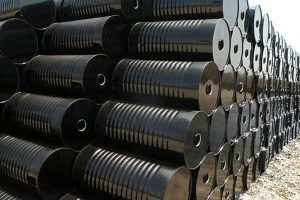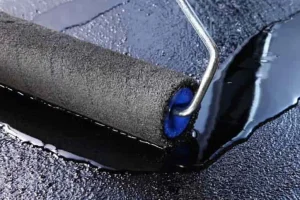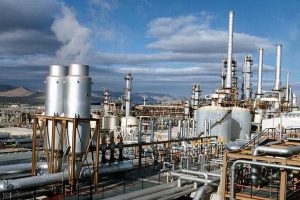Uses of Gilsonite: 8 Applications + Benefits and Challenges!
The uses of Gilsonite, also known as natural bitumen or mineral bitumen, are diverse and widespread. Due to its unique properties, this mineral has a special position in various industries. For instance, gilsonite has extensive use as a binding and reinforcing agent in the production of asphalt, bitumen, and waterproofing membranes, as well as in paints, inks, refractory materials, and even in oil well drilling. Additionally, the applications of natural bitumen in metallurgy, insulation, and resin manufacturing are expanding daily due to its high resistance to heat, water, and chemicals.
Therefore, in this Iran ETrade blog post, we will take a closer look at the various applications of Gilsonite and the reasons why it has become one of the most widely used compounds in the industry. For more information on the latest prices of bitumen and petroleum products, you can contact our experts at Iran ETrade.
Properties and Characteristics of Gilsonite
Some of the most important uses of gilsonite include drilling operations, the production of anti-corrosion coatings for the oil and gas industries, bitumen and waterproofing membrane production, asphalt production, moisture insulation, the paint and ink industries, and the manufacturing of chemical products.
Gilsonite, also known as natural bitumen, is a black mineral with high viscosity composed of solid hydrocarbon compounds. It naturally forms in vertical veins of underground mines. Furthermore, this material possesses unique properties that make it highly valuable for use in various industries.
Some of the most important characteristics of Gilsonite include:
- Black color, high gloss, and brittleness
- Excellent solubility in organic solvents
- Rich in asphaltenes and nitrogen
- High purity and good compatibility with petroleum compounds
- Strong hydrophobic property
- Melting point between 160 and 220°C
- Non-toxic with high resistance to acids and alkalis
Gilsonite was first discovered in 1860. However, its use as a waterproofing and moisture-resistant material was first introduced in the 1880s by Samuel H. Gilson. Eventually, in 1888, the demand for its commercial mining and use in various Industries increased.

Uses of Gilsonite
High water resistance reduced raw material costs, extended asphalt lifespan, and improved abrasion resistance are some of the key benefits of using Gilsonite.
With its unique composition and properties, Gilsonite has uses in more than 150 different industries. Below, we will explore some of the applications of natural bitumen, or Gilsonite, in various sectors.
In addition to the industries listed, Gilsonite is also applicable in medicine, automotive manufacturing, cosmetics and personal care products, construction, and the smelting and steel industries.
1. Use of Gilsonite in Drilling Mud
To use Gilsonite, they mix it with drilling mud to reduce erosion in the well walls and facilitate the drilling process.
2. Application of Gilsonite in Anti-Corrosion Coatings for Oil and Gas Sectors
One of the most important properties of Gilsonite is its high hydrophobicity and resistance to moisture. This trait has made it widely useful in various industries, including oil and gas, and as an anti-corrosion coating.
When combined with other additives, Gilsonite can create an effective insulating layer for different types of pipes that protects them against corrosion, rust, and decay.
3. Uses of Gilsonite in Asphalt and Road Construction
One of the most beneficial uses of Gilsonite is in asphalt production, which results in longer pavement life, greater cohesion and integrity, increased traffic load-bearing capacity, and improved resistance to temperature fluctuations in the asphalt.
Asphalt is one of the primary materials used in the road construction industry, made by combining bitumen, gravel, and sand.
However, using Gilsonite bitumen instead of conventional bitumen can increase the strength, durability, and resistance of asphalt.
In fact, asphalt produced with Gilsonite has outstanding and unique characteristics, among the most important of which are the following:
- Longer lifespan
- High resistance to weather conditions and temperature fluctuations
- Greater cohesion and integrity
- Increased tolerance to heavy traffic loads
- Reduced need for continuous repairs and maintenance
4. Uses of Gilsonite in the Foundry Industry
Another use of natural bitumen is in foundry and moulding. Gilsonite contains abundant hydrocarbons and plays a significant role in achieving flawless casting and moulding operations.
Furthermore, Gilsonite’s properties are useful in the iron and steel smelting industries. Therefore, adding natural bitumen to molten steel helps remove impurities such as sulfur, silica, and phosphorus from the mixture.
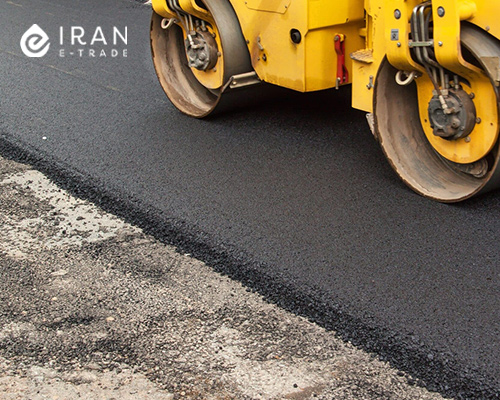
5. Uses of Gilsonite in the Jewellery and Ink Industry
Gilsonite also plays an important role in the printing and ink industry. This natural bitumen is a key ingredient in printing inks (for magazines and books), industrial inks (for packaging and plastic printing), artistic inks, paints, and industrial coatings.
In fact, Gilsonite is used as a hard resin and as a dispersing agent for carbon black in this industry.
6. Uses of Gilsonite: Production of Bitumen
Gilsonite is a strong waterproofing agent widely used for insulation in the construction industry, for waterproofing membranes, and in bitumen production. Therefore, the use of Gilsonite enhances the quality of bitumen and waterproofing membranes.
The application of Gilsonite in bitumen production is due to its excellent compatibility with petroleum materials, making it an effective waterproofing agent.
7. Production of Waterproofing Membranes (Isogum) as a Moisture Insulator
Due to its unique properties, Gilsonite has a special use in the insulation industry. One of its most important uses is in the production of waterproofing membranes.
Although other industrial bitumen are also used in the market, the use of gilsonite enhances the quality of these membranes thanks to its superior characteristics.
Advantages of Gilsonite-Modified Waterproofing Membranes:
- High shear strength
- Improved layer stability
- Maintained flexibility at low temperatures
- Low tendency to flow or shift
- Suitable for sloped surfaces
In addition to waterproofing membranes, industries use Gilsonite as a moisture barrier in road construction, building construction, oil pipelines, and storage tanks, especially in high-temperature conditions that demand thermal resistance.
8. Uses of Gilsonite in the Chemical Products Sector
Gilsonite exhibits high reactivity with many chemical substances and benefits from its unique physical and chemical properties. In industries such as metallurgy, wood products, and refractories, Gilsonite is used as an adhesive and coating material.
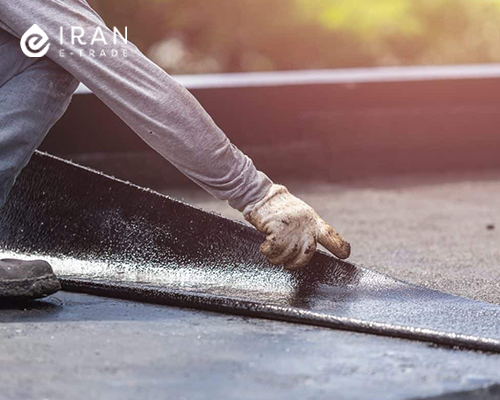
Challenges in the Uses of Gilsonite
Despite its numerous advantages, the use of Gilsonite also comes with negative consequences. For instance, one major drawback is the limitation of natural resources, which makes the extraction of this natural bitumen costly and complex.
Another challenge is that processing Gilsonite requires advanced technology and equipment, which restricts its use in industries.
Advantages of Using and Applying Gilsonite Bitumen
The use of natural bitumen, or Gilsonite, in various industries offers many benefits, including reducing raw material costs and increasing production efficiency.
1. High Water Resistance of Gilsonite
Gilsonite is a natural hydrocarbon with a complex structure composed of aliphatic chains and aromatic compounds. This unique composition gives Gilsonite exceptional resistance to water penetration.
Therefore, this property makes it a suitable and reliable choice for use in a wide range of industries, especially in harsh and humid environmental conditions.
Why Is Gilsonite Resistant to Water
Gilsonite’s unique physical and chemical properties enable it to effectively resist moisture and water penetration. The main factors contributing to this resistance, which make natural bitumen useful, include the following:
- Nonpolar Molecular Structure: The chemical composition of Gilsonite is such that water molecules cannot easily react with or penetrate it. Therefore, the strong intramolecular bonds and the nonpolar nature of the material create an effective barrier against forming hydrogen bonds with water.
- Hydrophobic Surface: Gilsonite naturally has a water-repellent surface. As a result, this property causes water droplets to remain on the surface without soaking in and to be quickly repelled, minimising the chance of moisture penetrating into the inner layers.
- Dense and Cohesive Texture: The compact and unified structure of Gilsonite plays a key role in preventing water from passing through it. Therefore, this high density ensures that Gilsonite performs reliably and resists moisture even in humid environments. These features make the use of Gilsonite bitumen highly advantageous across various industries.
The Importance of Gilsonite’s Water Resistance
Gilsonite’s resistance to water has made it a widely used material across various industries. The following are some applications of Gilsonite in industries that require water-repellent materials:
- Construction industries like waterproofing membranes and moisture barriers
- Oil and gas industries, including coatings for oil and gas pipelines to protect against corrosion; Paint and resin industries for producing water-resistant paints and resins.
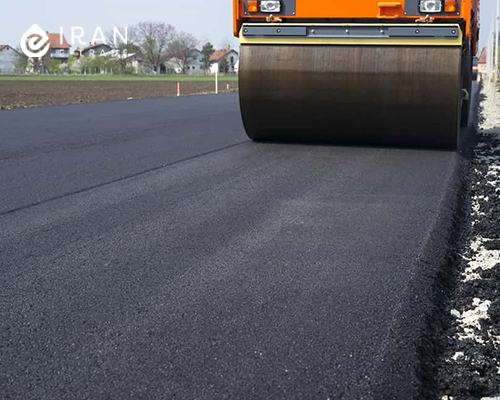
2. Cost Reduction in Gilsonite Applications
Uses of gilsonite can reduce costs in two ways:
- It replaces expensive raw materials; for example, industries use it as a substitute for synthetic pigments, synthetic resins, and chemical additives.
- It improves material efficiency; adding Gilsonite to product formulations lowers the consumption of other materials and reduces raw material expenses.
3. Increased Asphalt Lifespan
Another benefit of using Gilsonite bitumen is the extended lifespan of asphalt. Due to its unique physical and chemical properties, this natural bitumen plays an important role in improving the quality and durability of asphalt.
Advantages of Using Gilsonite Bitumen in Asphalt:
- Increased Mechanical Strength: By strengthening the bonds between particles, asphalt becomes more resistant to traffic stress, temperature changes, and moisture.
- Reduced Water Penetration: Gilsonite’s hydrophobic properties prevent damage caused by moisture, freezing, and thawing.
- Improved Rheological Properties of Bitumen: Asphalt performance improves at both high and low temperatures, reducing deformation.
- Slower Bitumen Ageing: Gilsonite stabilises the bitumen structure, thereby extending the pavement’s service life.
4. Gilsonite and Abrasion Resistance
Below is a detailed explanation of Gilsonite’s applications in enhancing abrasion resistance:
- Extended Product Lifespan: Gilsonite strengthens product structures, increasing their resistance to abrasion and prolonging their useful life.
- Reduced Maintenance Costs: Using Gilsonite extends product durability, significantly lowering maintenance expenses.
- Improved Performance in Harsh Conditions: Products containing Gilsonite show more stable performance against environmental factors such as moisture, pressure, and friction.
- Decreased Production Waste: Increased abrasion resistance causes products to wear out more slowly, reducing scrap and production waste.

Safety Tips for Uses of Gilsonite
Although Gilsonite has many applications, you should follow safety precautions when handling it, just like with any other chemical substance.
Eye Irritation
Gilsonite abrasion produces dust that can harm the eyes. Exposure to natural bitumen dust may cause eye irritation, accompanied by pain, tearing, redness, blurred vision, and swelling.
Skin Irritation
Irritation of skin from Gilsonite is neither common nor severe.
Storage Conditions for Gilsonite
Dust generated from Gilsonite can ignite or explode if exposed to flames, sparks, or temperatures above 570°C (1000°F). Therefore, during processes that produce Gilsonite powder, it is essential to prevent any sources of ignition.
Safety Conditions of Gilsonite:
- Chemical Stability: Gilsonite is stable and does not polymerise.
- Incompatibility: It reacts with strong oxidising agents such as chlorates, nitrates, and peroxides.
- Hazardous Decomposition Products: None.
- High-Temperature Safety: When exposed to temperatures above 288°C (550°F) for prolonged periods, wearing protective clothing and respiratory equipment is mandatory.
Under proper safety conditions, Gilsonite is a relatively stable and safe material for industrial applications.
Production of Bitumen Using Gilsonite
One of the most important applications of Gilsonite is its use in bitumen blends. Gilsonite strengthens the bitumen structure, enhancing its resistance to heat, water penetration, and abrasion.
Also, using Gilsonite in bitumen is common in countries such as Iran, India, and China.

Frequently Asked Questions About Uses of Gilsonite
In this Iran ETrade blog post, we discussed the uses, properties, and benefits of natural bitumen, or Gilsonite. Below, we provide brief answers to common questions on this topic.
Additionally, for online bitumen prices and real-time barrel bitumen rates, you can visit the Iran ETrade website.
What are the applications of Gilsonite in various industries?
Gilsonite is useful for producing asphalt, manufacturing bitumen, foundry processes, printing and industrial inks, and waterproofing membranes.
What are the benefits of using Gilsonite in industries?
Gilsonite helps reduce asphalt cracking and prevents its spread, offers high thermal and moisture resistance, lowers environmental impact, and improves bitumen performance at both low and high temperatures.
What are the challenges of using Gilsonite in industries?
The main challenges of uses of Gilsonite include its difficult and costly extraction, as well as the need for advanced technology to process and incorporate it into other compounds.
Why does Gilsonite increase the lifespan of asphalt?
The use of Gilsonite in asphalt enhances its lifespan by increasing asphalt’s resistance to stresses, reducing water penetration, improving rheological properties, and decreasing ageing susceptibility.
What are the main reasons for cost reduction in uses of Gilsonite?
Using Gilsonite replaces more expensive raw materials, improves material efficiency, and reduces the amount of raw materials needed, leading to an overall cost reduction.
Why does Gilsonite increase abrasion resistance?
Uses of Gilsonite can enhance abrasion resistance by forming a cohesive matrix between material particles, filling voids, increasing adhesion, and creating a protective layer on the material surface.
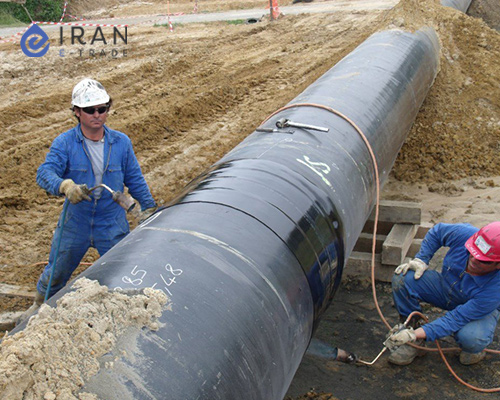
sources: geology, asiangilsonite
Bitumen Price
- Bitumen Suitable for Hot Climates: Benefits + Key Technical Tips
- How to Use Nano Bitumen: Properties & Applications + Method...
- Petroleum Products and Petroleum Derivatives: Introduction + Uses
- Oil Refineries in Iran: Complete List + Comparison
- Gasoline Producing Refineries in Iran: 12 Major Refineries
- Largest Oil Producers in the World: The Top 13 Countries...



